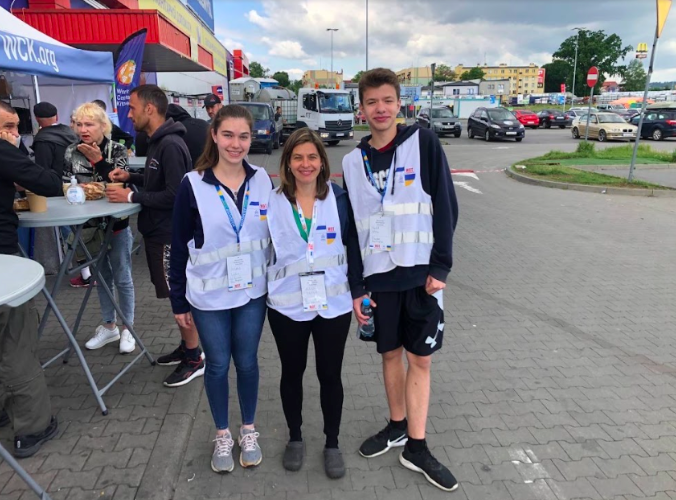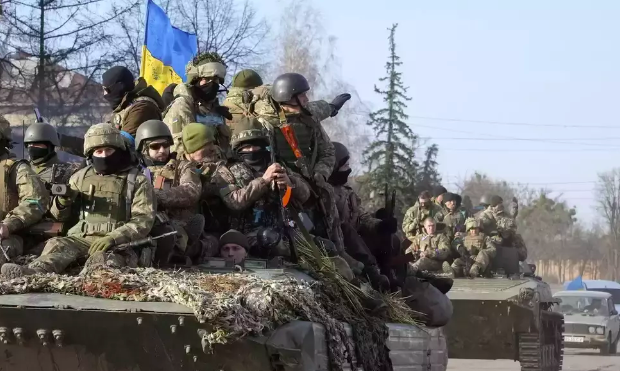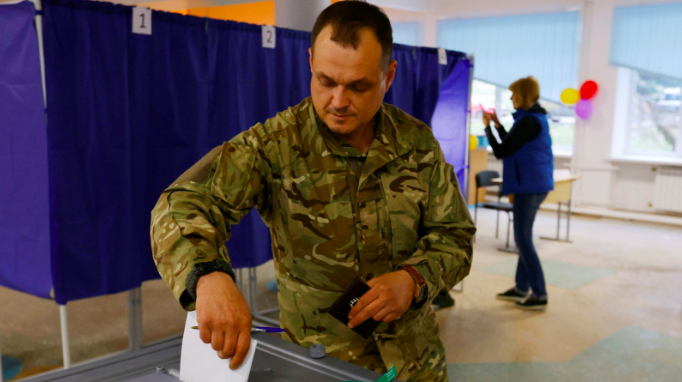Alex Gobran ’23 | Riya Shankaran ’26
While the ongoing conflict in Ukraine may seem far off to many, several students from the EA community have been deeply engaged in activism and education pertaining to the war.
This past summer, Lydia Nawrocki ’23 traveled to the Ukraine-Poland border and helped Ukrainian refugees cope with the tragic effects of the Ukraine-Russia War. Nawrocki describes how she began volunteering at the border, saying, “At the very start of the war I knew I wanted to do something. At first I tried to start a fundraiser through EA, but that didn’t work out because EA’s policies only work with sister schools. My mom started looking through friends of friends and eventually found this organization called Russians for Ukraine, which is essentially a group of people who are from all over the world, but have some sort of Russian origin.”

Photo Courtesy of Lydia Nawrocki ‘23
Volunteering through Russians for Ukraine was the best way for Nawrocki’s family to make an impact in the region without “putting [her] Russian family in danger since [she] didn’t have to be very public about it.” She elaborates, “If my Russian family and friends were even aware that I went, they would be at risk of ten to fifteen years in prison. So, they don’t know that I went. It’s for the safety of everyone. There’s a lot of people who disagree with what Putin is doing–I think rightfully so–and they could do something, but it wouldn’t leave much impact because they would be jailed and their families would have to deal with the repercussions.”
While not everyone has directly witnessed the repercussions of the war, students throughout the EA community are becoming more informed about the constantly evolving situation in Ukraine. Max Kelly, Upper School history teacher, explains how the conflict is being addressed in the Honors International Relations class, saying, “There’s three ways we’re covering talking about the war. The first is by teaching strategic theories, so looking at the role of strategy and handling kinetic conflict and non-kinetic conflicts. In regards to Russia and Ukraine, we are constantly pulling in current updates about what’s happening and applying it through one of the strategic lenses our class is learning about.”
In addition to theoretical approaches, the class also analyzes the conflict through expert insights (via outside speakers) and student-driven approaches (via case studies). Kelly states, “We are using these lenses to look at how to analyze what Russia is attempting to do, how Ukraine is trying to push back and resist the Russian influence, and how the U.S. should be looking at the conflict from the national security perspective.”
In mid-September, Ukraine changed the momentum of the war with Russia by reclaiming a large swath of the eastern part of the country. Blunders and poor judgment from Putin have served as the impetus for this shift in the war. Anika Agarwal ‘23 comments, “I think it’s particularly interesting to see the full consequences of Putin’s miscalculations as Ukraine makes territorial gains. He thought the invasion would be a ‘special military operation’ not an eight month long war. As a result, he’s struggling to sustain the effort. They’re having such a hard time finding soldiers, let alone trained ones.”

Photo courtesy of Times of India
Russia has countered by holding illegal referendums to annex four Ukrainian territories occupied by Russian soldiers. However, the legality and validity of the referendums are in question. Dr. Christopher Row, Upper School history teacher, asserts, “If we are going to give international law any meaning, any substance, it has to be enforced.”

Photo courtesy of Financial Times
While Russia’s control of those four regions was being voted on, Putin reinforced the fact that he has violent weapons to be used against the countries in NATO. As noted in an article by CNN, he declared, “I want to remind you that our country also has various means of destruction, and for separate components and more modern than those of NATO countries and when the territorial integrity of our country is threatened, to protect Russia and our people, we will certainly use all the means at our disposal.”
Some members of the EA community are worried about the potential repercussions of Putin’s threats. Agarwal shares, “I think that Russia’s threats to use nuclear weapons are particularly terrifying due to the fact that Biden has said that the U.S. will respond if nuclear weapons are used, and then we have to follow through with that threat. Normalizing nuclear attacks also sets a dangerous precedent in terms of the future of warfare.”
Although Ukraine has made promising progress in the war, the world continues to struggle with the ongoing consequences of the conflict. For instance, the war has caused disruptions in fossil fuels supplies and the overall global market, creating an energy crisis which has had broader implications on the international community.
London Pettibone ‘23, a member of Model UN and a student in the I.R.class, says, “I think that the growing energy crisis, which is affecting inflation in a lot of European countries, is causing the shift toward far-right candidates winning elections in Italy and Sweden.” She continues, “For example, in Sweden recently, the far-right party, which before this election had been extremely marginalized and had almost no supporters, has managed to become a party of the majority block in the Swedish Parliament. So, I think that a lot of European countries, because they’re feeling insecure about their sovereignty, are starting to look towards far-right candidates.”
In addition to the energy crisis, the war has also had severe civic consequences for communities in both Ukraine and Russia. Recounting her volunteering experience, Nawrocki says, “In seeing Ukrainian refugees in real life, there are people who have lost everything. Their houses have been bombed. Soldiers have come in and held people at gunpoint. There’s so many families that have nowhere to go.”
“It’s really sad, but at least they have each other and other people who are willing to help. I think that it’s really inspirational that the world has come to their aid in such a time of crisis.”
She also highlights the pervasive, yet numbing effect this violence has had on Ukrainian families, stating, “There was a boy playing at the playground at the refugee center, and his hands were wrapped because they burned due to an explosion by his house. His family was running away as the house went up in flames. I would see him just coloring in a book with the other kids there. The kids are all just trying to live. The parents are all trying to figure out their situation.”
Fortunately, Ukraine is not alone in its fight against Russia. The country is getting support from the U.S. and Western European nations, which comes in the form of direct aid to Ukraine through supplying weapons and other necessities, and sanctions against Russia. There are different views on how effective these sanctions are. The European Union and the U.S. imposed sanctions on natural gas and oil, two of Russia’s biggest exports. An article from Bloomberg recalls a comment from Putin, who asserted, “Sanction restrictions on Russia cause much more damage for those countries that impose them.” Row disagrees, “The fact that Putin said that shows it is harming him.”
While the conflict between Ukraine and Russia has caused an international crisis, much can be learned from it. Row states, “I’d say the biggest lesson [this war has taught] is democracy. Good governance is not guaranteed, and international law is not guaranteed. Thomas Hobbes, one of the great political theorists of the 17th century, said that ‘covenants’, or contracts, ‘without swords are but words.’”
In anticipating the future of the conflict, Row is resigned to the possibility that it will be a long war “potentially of attrition with little movement.” Nevertheless, the strength displayed by victims and support from the international community lends hope to the future. Nawrocki states, “It’s really sad, but at least they have each other and other people who are willing to help. I think that it’s really inspirational that the world has come to their aid in such a time of crisis.”
She also believes that it is important to remember that there is more than one narrative to the war, stating, “It’s really a political issue, and less so about the perspective that ‘all Russians are bad.’ It’s bad on all sides. War is war. Suffering is everywhere. I also think there are small things we can do as a school. I remember last year in Chapel we would pray for Ukrainians and hope for peace, and to bring that back I think would be impactful.” She continues, “It’s still happening, and I think that if we could acknowledge that a little more often, it would be useful.”
Nawrocki’s sentiments and sense of initiative are reflected in the focus of the International Relations class. Kelly explains, “The goal of this class is to give students the opportunity to figure out how to solve actual problem sets pertaining to current conflicts and I think that’s a unique approach to understanding historical contexts, like what is the historical relationship between Ukraine and Russia, the history of NATO versus the Soviet Union and Putin’s therefor perception of what that all means to him.” He adds, “We shift gears into giving students more ownership of how to solve problems that are happening throughout the global community. I think that it’s important for students to recognize that they are capable of coming up with solutions to international problems using history, theory, and professional skills.”